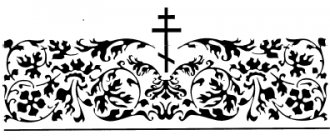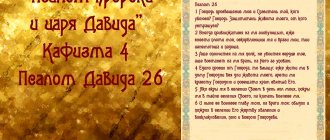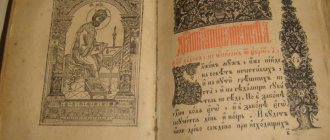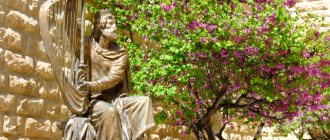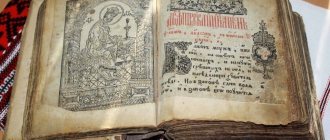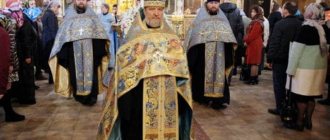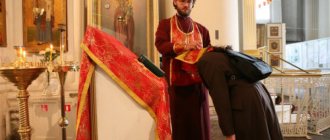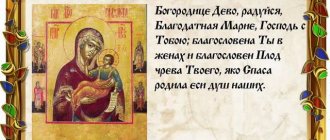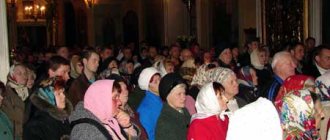The oldest prayer book
Formally, the Old Testament Psalter can be considered the very first prayer book compiled. Every psalm is a prayer. Some psalms (for example, the 50th “Have mercy on me, O God, according to Your great mercy...”) are still included in current prayer books.
The Psalter is, in fact, the earliest prayer book - compiled before the Nativity of Christ.
But if we talk specifically about prayer books designed specifically for the laity to pray at home, then their distribution is associated with the development of printing. And before that, handwritten prayer books were available either only in monasteries (for cell reading by monks) or among the wealthiest residents. And, of course, kings.
While books were handwritten, prayer books remained a rarity. Only monasteries, churches, rich laypeople and, of course, the king had the opportunity to keep them.
Previously, did you read books of hours rather than prayer books?
This is the most interesting moment. As such, the morning and evening rules that we are reading now entered Church use relatively recently. And before that, the laity read books of hours, and by prayer books they were understood.
The Book of Hours is a prayer collection that contains the majority (and in fact, almost all) of the services of the daily cycle: Matins, Compline, Midnight Office and, in fact, the Hours.
These services, unlike the Liturgy, are primarily readings. They consist of psalms and prayers compiled in the first centuries of Christianity.
In Rus' (and, say, in Greece to this day), the laity read the Midnight Office in the morning, and Compline in the evening. During the day - if there was an opportunity and desire - a clock. (There was only one restriction - when reading, omit those rare lines that were intended exclusively for the priest).
Reading the Book of Hours by the laity has its advantages. Reading them, a person feels even better his involvement in the Church. It is as if he does not break away from Church life, but continues it - directly at home.
Book of Hours of the 18th century. No longer handwritten, but printed. Although the text of the funeral prayer is inscribed to the left of the hand.
Interpretation of the Six Psalms
These selected psalms, in which the Son incarnate speaks to the Father, deserve thoughtful interpretation. For this we turn to the holy fathers and teachers of our Church .
Psalm 3
Saint Gregory says the following:
“The third psalm foreshadows the temptation coming to you from the enemy, so that you, already anointed to the kingdom for faith and co-reigning with the true Anointed One, intends to overthrow you from this dignity not by someone external, but by someone who comes from you.
For the enemy does not have power over us borrowed from the outside, and we are not overthrown from our dignity by anyone else, unless we ourselves, through severe torment, become the fathers of evil offspring...”
The psalm was written during the oppression of David by Absalom. If we draw a parallel with our soul, then all of us, being in distress, can trust in the mercy of God.
“I lie down, sleep and get up, for the Lord protects me.” (Ps. 3:6).
Psalm 37
The 37th psalm occupies second place in the six psalms.
With the words of this psalm, every believer repents before God of his sinfulness with a confession of complete submission and devotion to His will (v. 16). The person here expresses a desire in the coming day to make amends for the bad deeds he has done before (Article 19), says Professor A.P. Lopukhin
This is the most emotional psalm. David is exhausted from his illnesses. By that time, he was struck by a terrible disease that caused unbearable torment. The psalmist understands that he is suffering deserved punishment from God. He screams in pain and cries out to God to get rid of it, because his body is covered with ulcers so deep that even his bones are affected.
Prophet David. 1727–1728. Moscow. 96 × 40 cm. Wood, tempera. From the Peter and Paul Cathedral in St. Petersburg
Researchers are of the opinion that it was some kind of unknown disease. Because if the king had been stricken with leprosy, the public would have found out about it and would have revolted. Rather, this disease was associated with the “loins”, i.e. deprived David of his ability to bear children.
“For my loins are full of inflammation, and there is no room in my flesh.” (Ps. 37:8).
Psalm 62
Waking up early in the morning, David's soul grieves that he cannot attend services in the tabernacle, cannot praise God in Jerusalem. He longs to return from exile and sing prayers of gratitude to God.
The psalmist is ready to give everything in order to live under the mercy of the Lord.
“For Your mercy is better than life. My lips will praise You” (Ps. 63:4).
By mercy we mean the grace of God and His good deeds.
Psalm 87
This psalm differs from others in its greatest sorrow. The author is Heman , a contemporary of David, his closest comrade-in-arms, accompanying him everywhere.
Heman describes David's unbearable suffering, both physical and spiritual. Persecuted by his own son Absalom... A martyr, whose body is broken by a terrible disease, and whose soul is pricked by conscience for committing grave sins. These sufferings were aggravated by the grief of loss: their common child with Bathsheba, born in adultery, died.
The difficult lines of the psalm show that David is on the verge of despair. He becomes exhausted and compares himself to a person who is dying.
“I have become equal with those who go down to the grave; I have become like a man without strength” (Ps. 87:5).
The psalmist’s sins were so vile that all his relatives and acquaintances turned away from him. Everyone despises and hates him.
“My eye is weary of sorrow” - the psalmist’s eyes hurt from tears and sobs and are tired of looking for salvation from God.
Why, O Lord, dost thou tear away my soul, and hide thy face from me? Ps.87:15.
“Why don’t you, Lord, hear me and fulfill my requests?”,
Praying to the Lord , David remembers that he has suffered “from his youth” from Saul, and now from Absalom. The psalm ends on this sad note.
When did morning and evening rules appear?
There is no exact answer to the question of when and why the familiar Morning Prayers and Prayers for Sleep for the Future appeared. Briefly speaking, we can say that:
- The Morning and Evening rules are a distant “echo” from the Midnight Office and Compline - both there and there the same prayers are found.
- The first attempts to add prayers for the laity to the book of hours began in Rus' in manuscripts - around the 16th century.
- Over time, with the spread of printing, such attempts became more or less commonplace.
- At the end of the 19th and the very beginning of the 20th centuries, they had already become practically established. And, probably, it was then that the current composition of prayers was finally formed.
- And quite finally, the Morning and Evening Rules, as the only practice for the laity, became in Soviet times - thanks to the same type of prayer books of the Moscow Patriarchate - they were the only prayer books in the USSR.
The Spiritual Meaning of the Six Psalms
The psalmist David wrote his spiritual poems throughout almost his entire life. They contain prayer appeals to the Almighty during times of sorrow, misfortune, adversity, persecution, and suffering. And some of them express a feeling of repentance and gratitude.
The importance of these psalms is emphasized by the structure of the service. They are the central place in the all-night vigil and are read throughout the year, with the exception of Easter week.
The Psalms express the idea of universal expectation of the Messiah. They are read with humility and hope that the Savior will come to save humanity from the devil and spiritual death.
Why did the Morning and Evening Rules appear?
Now no one knows the answer to this question. Perhaps it was like this: at some point, the Church hierarchs considered that the liturgical texts of the Book of Hours did not correspond to the impulses of the soul that confront a person in the world - an environment of hectic work and everyday family worries.
Maybe they thought that the Midnight Office and Compline were too short if they were read only during the day - without, say, the clock.
Well, at some point, out of all the variety of “worldly” prayer rules that existed, one became established - the one that we see in prayer books now.
The current composition of the Morning and Evening Prayers is unchanged and is the same in all prayer books.
Psalm 142
This psalm is the last in the sixth psalm. Having strengthened a person in the hope of receiving salvation (Ps. 102), the Church on behalf of the believers prays to God to show him the path of activity (8th article), teach him to do His will and honor him with the “land of righteousness,” reflects A.P. Lopukhin.
There are such difficult moments in David’s life when he understands that his enemies can lead him to death. At the same time, the psalmist prays to the Lord that He will not allow this to happen.
At such moments, David remembers the many blessings of God towards the Jewish people. God loves repentant sinners and will not allow them to perish.
The psalmist asks to show him the true path and teach him to fulfill the holy will of God.
Is it possible for the laity to read the Book of Hours?
Is it possible to read the Midnight Office instead of evening prayers, and is it possible to read the Hours to the laity?
There is no prohibition in this regard. However:
- It is better to clarify this issue with your confessor first. Traditions are also a very important thing. Nowadays it is accepted this way, and it is better to go against this tradition not out of self-will, but out of blessing.
- If you read the Hours or Compline, then you must definitely omit the words that are intended for the priest (they are marked in the book of hours as “Exclamation:”, “Priest:” or “Priest:”).
As for the time at which the hours should be read, the following practice has developed in the Church tradition:
- The 1st hour refers to 7 am.
- 3rd hour - by 9 am.
- 6th hour - by noon.
- 9th hour - by 15:00.
This time is a guideline. In churches and monasteries, due to today’s realities, this time is not observed, and the hours are often combined with evening and morning services.
Psalm 102
The main theme of Psalm 102 is God's providence in human life . This is the king's song of thanksgiving for all His great benefits.
“The Lord is generous and gracious, slow to anger and abounding in mercy.”
(Ps. 102:8)
“For as the heavens are high above the earth, so great is [the Lord’s] mercy toward those who fear Him.”
(Ps. 103:11).
God's mercy is incomparable. Despite the terrible fall from sin, God forgives the psalmist and gives His material and spiritual blessings. He delivers the repentant sinner from sins , mental torment, spiritual and physical death.
Sinner's repentance
The wrath of the Lord is replaced by mercy. Just as a father cannot be angry with his children for long, so “the Lord has mercy on those who fear Him.”
What prayers are included in the prayer book?
There are no canonical regulations regarding the composition of the prayer book in the Church. But at a minimum, it contains four parts:
- Morning prayers.
- Prayers for the future to sleep.
- Follow-up to Holy Communion.
- Prayers for Holy Communion.
Sometimes the Psalter is added. Even more often - prayers for one or another occasion in life.
The range of prayer books is now wide - everyone can choose the option that suits them.
There is also no difference whether the prayer book is written in Russian or Church Slavonic. You need to read the one that is more convenient for you personally.
In some pre-revolutionary publications, the names of the then living emperors were immediately printed in the texts of the books of hours. In this, for example, edition of the 18th century - Empress Catherine the Great and members of her family.

